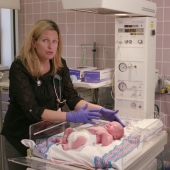Oh waterbirth. Well actually I have to admit they're one of my favorite type of birth. And so when you're low risk and indeed later on and we're just about to introduce birth activists up on the labour water so they're going to be our champions of water births for high-risk women and so later on them in the year we'll be having that service so whether you're high risk or low risk you'll you'll all be able to experience the joy of a water birth.
So water birth is it's a deep pool of water. It's probably about three foot deep something like that. It's warm it's thirty six degrees and you get into the pool when you're in established labour. So as I've said before established labour is when you're four to five centimeters or if you're a second time mummy when you're contracting regularly and painfully you know you're in labour, when you're a second time mummy.
So you go into the water to ease the pain. Water in labor is not all about water birth. I've been a midwife for 32 years now so, I've seen lots of women go “I really really want a water birth, I want to get into the pool”. And then they get in and they think “oh I don't like it, I want to be on dry land”. And other people say “I'm never getting in the water”, they get in and you don't get them out. So it's about pain relief. It's a really relaxing thing it it just soothes you, it's like you're weightless for the first time.
You know it's been quite hard at the end of pregnancy carrying around that big big baby in your tummy. You've been quite uncomfortable so I think part of it is that relaxing and and sort of being in control yourself, being in a sort of space where it's just you. So you labor you can use gas and air in the water and you just labor on through. It's perfectly safe to give birth in under water. In fact 45 percent of the women that come to our birth center actually do end up giving birth in the water.
Probably about 55 percent use it for pain relief in labour, but people sometimes worry all my baby's going to drown. Well if you think about it your baby is living in water for nine months of your pregnancy and basically what we do is we make the temperature of the water the same as the temperature of the water inside of you so the baby doesn't know it's been born. It's still getting oxygen from it's umbilical cord. So there's no need to worry about your baby drowning.
They've also got this wonderful thing called a dive reflex which you can ask your midwife about. I won't go into that now, but it's perfectly safe and it's a very gentle birth, for both you and the baby. And women that have water birth have less perineal damage. And one of the other questions that's common is “can I go in the water if I've got Group B Strep” and the answer is “yes you can”. We just put a little cannula in and we give you your antibiotics excel you in the pool.
What Does Latent Phase of Labour Mean?
What Does Vaginal Birth After Cesarean Section (VBAC) Mean?
What is a Water Birth an What Are the Pros and Cons?
What Are My Options for Pain Relief During Labour?
- 32 views













